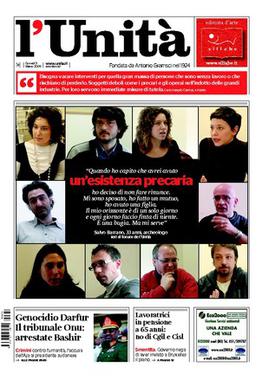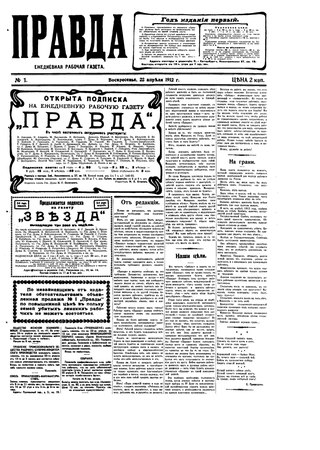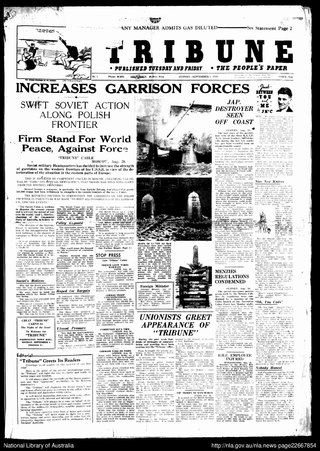
De Waarheid (literally 'The Truth') was the newspaper of the Communist Party of the Netherlands.

De Waarheid (literally 'The Truth') was the newspaper of the Communist Party of the Netherlands.
It originated in 1940 under the German occupation as a resistance paper, the day after general H.G. Winkelman had forbidden publication of the earlier Communist Volksdagblad. The party decided on May 15, 1940, to continue the Volksdagblad illegally under the name De Waarheid. The first months were spent setting up a nationwide network of 'handout points' ('stencilposten'), the main articles would be written centrally, whereas the different 'handout points' added localized articles. These local versions sometimes were published under different names as 'De vonk' ('The spark') and 'Het noorderlicht' ('The northern light').
![Post n.a.v. een prijsvraag van De Waarheid (krant), Gedempte Gracht [nl], Zaandam, 28 augustus 1947 08-28-1947 02507 Prijsvraag.jpg](http://upload.wikimedia.org/wikipedia/commons/thumb/a/aa/08-28-1947_02507_Prijsvraag.jpg/220px-08-28-1947_02507_Prijsvraag.jpg)
In the last decades it became a more independent left wing newspaper but circulation continued to drop and the paper was discontinued on 28 April 1990. [2]
| Anthoon Johan Koejemans | 1945–1948 |
| Fred Schoonenberg Paul de Groot | 1948–1949 |
| Fred Schoonenberg Friedl Baruch | 1949–1953 |
| Marcus Bakker | 1953–1958 |
| Joop Wolff | 1958–1978 |
| Gijs Schreuders | 1978–1982 |
| Bart Schmidt | 1982–1983 |
| Constant Vecht | 1983–1986 |
| Paul Wouters | 1986–1988 |
| Frank Biesboer | 1988–1990 |

The Morning Star is a left-wing British daily newspaper with a focus on social, political and trade union issues. Originally founded in 1930 as the Daily Worker by the Communist Party of Great Britain (CPGB), ownership was transferred from the CPGB to an independent readers' co-operative, the People's Press Printing Society, in 1945 and later renamed the Morning Star in 1966. The paper describes its editorial stance as in line with Britain's Road to Socialism, the programme of the Communist Party of Britain.

The Communist Party of the Netherlands was a communist party in the Netherlands. The party was founded in 1909 as the Social Democratic Party (SDP) and merged with the Pacifist Socialist Party, the Political Party of Radicals and the Evangelical People's Party in 1991, forming the GroenLinks. Members opposed to the merger founded the New Communist Party of the Netherlands.

Xinhua Daily was the first newspaper published in the People's Republic of China by the Chinese Communist Party (CCP). It is owned by the Jiangsu Provincial Committee of the CCP.

l'Unità is an Italian newspaper, founded as the official newspaper of the Italian Communist Party (PCI) in 1924. It was supportive of that party's successor parties, the Democratic Party of the Left, Democrats of the Left, and, from October 2007 until its closure in 2017, the Democratic Party.

People's Voice is a Canadian newspaper published fortnightly by New Labour Press Ltd. The paper's editorial line reflects the viewpoints of the Communist Party of Canada, although it also runs articles by other leftist voices. Established in 1993 under this name, the paper and online service have a history of ancestral publications dating to the early 1920s, when the first paper of this line was founded by the new Communist Party of Canada.

Politiken, later named Folkets Dagblad - Politiken was a Swedish Communist newspaper that existed from April 1916 to August 1940.

The Dutch resistance to the German occupation of the Netherlands during World War II can be mainly characterized as non-violent. The primary organizers were the Communist Party, churches, and independent groups. Over 300,000 people were hidden from German authorities in the autumn of 1944 by 60,000 to 200,000 illegal landlords and caretakers. These activities were tolerated knowingly by some one million people, including a few individuals among German occupiers and military.
Arbeider-Avisa was a daily newspaper published in Trondheim, Norway, started in 1924 and defunct in 1996. Until 1989 it was officially the newspaper for the Norwegian Labour Party.

The Augsburger Allgemeine Zeitung is a major German regional daily newspaper published since 1945.

For a number of decades after its establishment in August 1901, the Socialist Party of America produced or inspired a vast array of newspapers and magazines in an array different languages. This list of the Non-English press of the Socialist Party of America provides basic information on each title, along with links to pages dealing with specific publications in greater depth.

Frans Johannes Goedhart was a Dutch journalist, politician and during World War II member of the Dutch resistance. Having spent most of his youth in orphanages and having received little formal education Goedhart became a journalist for several local and regional newspapers in the 1930s. During this period Goedhart became a fierce anti-communist and anti-fascist and became wishful of political reform based on socialism.

Saul "Paul" de Groot was a Dutch politician of the Communist Party of the Netherlands (CPN). He was also a member of the House of Representatives for the CPN and chief editor of the party newspaper De Waarheid.

Pravda is a Russian broadsheet newspaper, and was the official newspaper of the Central Committee of the Communist Party of the Soviet Union, when it was one of the most influential papers in the country with a circulation of 11 million. The newspaper began publication on 5 May 1912 in the Russian Empire but was already extant abroad in January 1911. It emerged as the leading government newspaper of the Soviet Union after the October Revolution. The newspaper was an organ of the Central Committee of the CPSU between 1912 and 1991. After the dissolution of the Soviet Union, Pravda was sold by the then Russian president Boris Yeltsin to a Greek business family in 1992, and the paper came under the control of their private company Pravda International.

Al-Ittihad is an Arabic language daily newspaper in Israel. Based in Haifa, it was established in 1944 and is owned by the Israeli Communist Party. It is the oldest Arabic media outlet in Israel and considered the most important. The newspaper is currently edited by Aida Touma-Suleiman.
Tiesa was the official daily newspaper in the Lithuanian SSR. Established in 1917, the newspaper soon became the official voice of the Communist Party of Lithuania. After the Lithuanian victory in the Lithuanian–Soviet War, the party and the newspaper were outlawed in Lithuania. Thereafter, it was first printed in exile and later illegally in Kaunas. Tiesa survived irregular publishing schedules, frequent relocations, staff changes, and other difficulties and, after the Soviet occupation of Lithuania in June 1940, became the official daily of the new communist regime. At its peak, its circulation exceeded 300,000 copies. After the collapse of the Soviet Union, Tiesa lost its official status and its circulation shrunk. The publication was discontinued in 1994.

Tribune was the official newspaper of the Communist Party of Australia. It was published by the Central Committee of the Communist Party of Australia from 1939 to 1991. Initially it was subtitled as Tribune: The People's Paper. It was also published as the Qld Guardian, Guardian (Melbourne), Forward (Sydney). It had previously been published as The Australian Communist, (1920-1921) The Communist, (1921-1923) and the Workers' Weekly (1923-1939).

Aat (Adri) Breur-Hibma was a Dutch draftswoman and painter. During World War II, she entered the Dutch resistance and ended up as a Nacht und Nebel prisoner in Ravensbrück. There she made poignant pencil drawings of fellow prisoners that are preserved at the Rijksmuseum in Amsterdam. She was recognised as Righteous Among the Nations in 1995.

Bintang Merah was a magazine of the Communist Party of Indonesia which published in Jakarta from 1945 to 1948 and again from 1950 to 1965. It described itself as a magazine of Marxist-Leninist politics and theory.

Daniël "Daan" Goulooze was a Dutch Jewish construction worker who was a committed communist and resistance fighter. In 1925, he became a member of the Communist Party of the Netherlands (CPN) and by 1930 had become an executive member of the organisation. In 1934, he formed Pegasus, a publisher of many left-wing writers and intellectuals in the Netherlands, some for the first time. In 1935–1936, Goulooze formed the Dutch Information Service (DIS), an organisation that supplied information to the Soviet Union. Goulooze become the liaison between the organisation and the CPN. In 1937, he went to the Soviet Union, where he received intelligence training at the Marx–Engels–Lenin Institute in Moscow. Upon returning, he became the liaison officer of Communist International (Comintern) in the Netherlands, his main duty being to maintain on-going radio contact with Soviet intelligence.